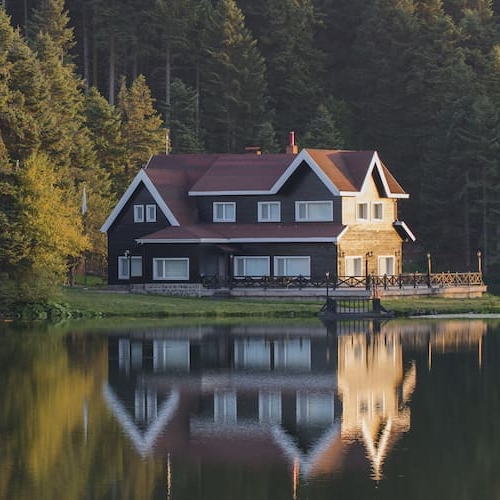What is hazard insurance for homes: A homeowners guide
Jun 6, 2024
•4-minute read
Hazard insurance is an essential part of protecting your property as a homeowner. It can provide you with financial protection and peace of mind against natural disasters like fires, storms and earthquakes.
Although it’s necessary for many locations, some people are unaware that hazard insurance exists or why they might need it.What is hazard insurance?
Hazard insurance protects your home from natural disasters or hazards. It’s usually a requirement when qualifying for a mortgage.
Some regions also require the purchase of a Natural Hazard Disclosure report, also known as an NHD report, which shows if your property rests in a natural hazard zone or high-risk area. These hazards may include fires, severe windstorms, hail, sleet or other natural events.Is there a difference between hazard insurance and homeowners insurance?
Hazard insurance is a subsection of homeowners insurance and not separate home insurance coverage. Therefore, it’s important to note that while lenders refer to hazard insurance separately, it’s a portion of a homeowners insurance policy that protects against most natural disasters.
Besides protecting against hazards, homeowners insurance covers other events, too, like stolen personal belongings, damage to your home’s structure or injuries that can occur in the home.
How does hazard insurance work?
Let’s say a person has hazard insurance, and the specific natural occurrence that happens is covered within their policy.
In that case, the homeowner will be compensated for the damage that occurs to their property. Even if a property isn’t in a high-risk area, it’s wise to have hazard insurance to protect your property and finances.
An example of hazard home insurance
Imagine that you have hazard insurance coverage that protects against straight-line winds and your roof is damaged by a windstorm. You can file an insurance claim for the roof and some of your outdoor furniture that was also damaged.
You have a deductible of $800, but the sustained damages will cost about $3,000 to fix. This means your insurance company will pay you $2,200 for the repair and replacement costs.
What does hazard insurance cover on your home?
It can be confusing to understand what is and isn’t covered by a hazard insurance policy. In general, hazard insurance will cover only the occurrences listed explicitly in the policy.
Therefore, it’s crucial to ensure that your hazard insurance policy covers disasters in your area. For example, if you live in the mountains, it may be reasonable to expect heavy snow and the potential damage it can bring.
What’s covered vs. not covered
Most natural disasters and some malfunctions within the home are covered by hazard insurance. However, certain types of damage aren’t covered and you may need special or additional policies.
For example, if your home is in an earthquake-prone area, it may not be covered by hazard insurance. So you might want to also purchase earthquake insurance separately.
Your hazard insurance coverage will change depending on where you live. You may want to add additional insurance or purchase a separate policy that covers specific occurrences.
| Covered by hazard insurance | Not covered by hazard insurance |
|---|---|
| Fire and smoke damage | Damages to personal property |
| Wind damage | Injuries sustained on your property |
| Hail damage | Water damage caused by flooding |
| Lightning damage | Earthquakes |
| Damage from snow, ice or sleet | Landslides |
| Damage from vehicles (including cars and aircraft) | Mudslides |
| Fallen trees and other objects | Pest infestations |
| Theft and vandalism | Mold damage |
| Damage caused by heating, AC units or electric currents | General wear and tear |
How much does hazard insurance cost?
The cost of hazard insurance differs depending on several factors:
- Where you live
- Your credit score
- Your claims history
In certain areas prone to natural disasters such as flooding or earthquakes, you may have higher add-on costs or need to purchase them separately if not already included.
Since hazard insurance is especially expensive in some areas, many mortgage lenders offer an escrow account that splits the cost of an annual insurance premium into monthly payments.
Home hazard insurance FAQs
Explore these frequently asked questions to learn more about hazard insurance and how it works.
Do mortgage lenders require you to buy hazard insurance?
Qualifying for a mortgage usually requires you to have a certain amount of hazard insurance under your homeowners insurance policy. Additional coverage, like for tornadoes, might be required by your lender, based on your area's natural disaster risk. Keep in mind that requirements vary by lender and location, so consider this when shopping for a mortgage.
Can I remove hazard insurance from my mortgage?
Once you pay off your mortgage, you may be able to adjust coverage or have your lender remove the mortgage lien from your house, allowing you to remove the hazard insurance. If you cancel hazard insurance, you will be fully responsible for any property damage or loss caused by natural disasters.
How do I get hazard insurance?
Most mortgage lenders require homeowners insurance as part of buying a house. Hazard insurance falls within the general homeowners insurance policy, which means in order to get hazard insurance coverage, you need to have a homeowners insurance policy.
To find the best hazard insurance for your home and budget, get multiple quotes to ensure you have the right amount of coverage at an affordable price.The bottom line: Do you need hazard insurance for your home?
Hazard insurance is a part of homeowners insurance. Depending on where you live and your lifestyle, your insurance may or may not include all the coverage you need.
Therefore, it’s wise to speak with your insurance agent and your mortgage lender to ensure you have the necessary coverage for your area.
Now that you understand how hazard insurance can protect a home, start the mortgage process today if you’re ready to explore your loan financing options.

Ashley Kilroy
Ashley Kilroy is an experienced financial writer. In addition to being a contributing writer at Rocket Homes, she writes for solo entrepreneurs as well as for Fortune 500 companies. Ashley is a finance graduate of the University of Cincinnati. When she isn’t helping people understand their finances, you may find Ashley cage diving with great whites or on safari in South Africa.
Related resources

6-minute read
What is vacant home insurance and why do you need it?
If you plan to leave your home unoccupied, a vacant home insurance policy can protect your property. Learn more about these policies and what they cover.
Read more
6-minute read
Is home insurance tax deductible?
Homeowners can’t deduct homeowners insurance from income taxes, unless it’s a rental property. Learn more about which homeownership expenses are tax...
Read more

7-minute read
What is homeowners insurance and how does it work?
Mortgage lenders require homeowners insurance, which reimburses you if your home is damaged or destroyed. Learn how to choose the right policy for your home.
Read more